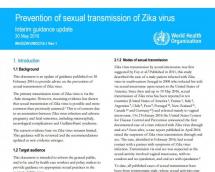Prevention of Sexual Transmission of Zika Virus
This document is an update of guidance published on 18 February 2016 to provide advice on the prevention of sexual transmission of Zika virus.
The primary transmission route of Zika virus is via the Aedes mosquito. However, mounting evidence has shown that sexual transmission of Zika virus is possible and more common than previously assumed. This is of concern due to an association between Zika virus infection and adverse pregnancy and fetal outcomes, including microcephaly, neurological complications and Guillain-Barré syndrome.
This document is intended to inform the general public, and to be used by health care workers and policy makers to provide guidance on appropriate sexual practices in the context of Zika virus
Last modified: March 25, 2019
Language: Arabic, Chinese, English, French, Spanish

